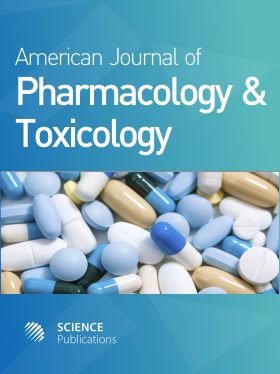Camel's Milk Protects Against Cadmium Chloride-Induced Hypocromic Microcytic Anemia and Oxidative Stress in Red Blood Cells of White Albino Rats
- 1 King Khalid University, Saudi Arabia
Abstract
Problem statement: Cadmium is a heavy metal of wide occupational and environmental contamination. In recent years, however, Cadmium has been implicated in the pathogenesis of several clinical disorders. One of the most frequently described problems in aluminum toxicity is anemia. Therefore, the present study was carried out to determine the effectiveness of Camel's milk in alleviating the toxicity of Aluminum Chloride (AlCl3) on certain hematological parameters and antioxidant system components in the RBC's of white albino rats. Approach: Albino rats of both sexes (6/group) weighting between 230-250 g were divided into three treatment groups: Group one were rats given normal saline and served as control group, group two were rats treated with 2 mL of a solution containing cadmium chloride (10 mg kg-1) and named Cadmium chloride treated rats, group 3 were rat treated with 2 mL of a solution containing Camel's milk in which the same concentration of cadmium chloride was dissolved and named Camel's milk and Cadmium chloride treated rats. Rats were orally administered their respective doses every day for 21 days. Evaluations were made for hematological parameters in the blood and for oxidative stress components in the RBC's. Results: Results obtained showed that oral Cadmium chloride treatment caused a significant decrease in total red blood cell counts, Hematocrite (PCV) value, Hemoglobin (Hb) concentration, Meancorpuscular Volume (MVC), Mean Hemoglobin Concentration (MHC) and Mean Corpuscular Hemoglobin Concentration (MCHC). Also oral administration of Cadmium chloride induced free radicals and as a result caused a significant decrease in the activities of Superoxide Dismutase (SOD), Catalsae (CAT) and reduced glutathione (SGH) in the RBCs homolysate. The oral administration of Camel's milk with cadmium chloride alleviated it's toxic effect. Camel's milk administration resulted in a significant increase in the in total erythrocytes count, blood Hb, PCV, MCV, MHC and MCHC. Camel's milk reduced free radicals production and oxidative stress status in the RBC's noticed by the significant increased activities of SOD and CAT, as well as concentrations reduced glutathione (SGH). Conclusion: The above results indicated a protective effect of camel's milk oral administration against cadmium induced anemia and oxidative stress in the RBC's of white albino rats.
DOI: https://doi.org/10.3844/ajptsp.2009.136.143

- 7,099 Views
- 5,665 Downloads
- 21 Citations
Download
Keywords
- Camel's milk
- cadmium chloride
- oxidative system
- hematological values
- rats
